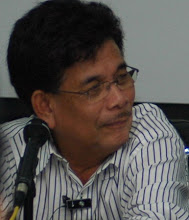by Chandra Muzaffar
HOW ethnic interests are addressed in the nation's economic and social development will be one of the major determinants of the success or failure of 1Malaysia.
It was with the advent of British colonial rule and the mass influx of Chinese and Indian migrant labour that the question of ethnicity in its present form emerged as a formidable challenge. It was because colonial capitalism had become so dominant, and had, in the process, enhanced the power of both the British and their Chinese compradors that the former, at the urging of the Malay elite, introduced Malay reserves, and set aside business licences and scholarships for the community as a sort of sop to a people who had been marginalised in the land which carried their name and embodied their identity. (Read NST Report here)
This was the beginning of the Special Position of the Malays and the other indigenous communities, which is now entrenched in the Constitution. For the Malays, Special Position at the time of Merdeka in 1957 was the armour that protected an abysmally poor people after their rulers had conferred citizenship, on extraordinarily generous terms, upon more than a million recently domiciled Chinese and Indians. A market economy in which the Chinese were ubiquitous added significance to that armour just as democratic competition for votes made it inevitable that popular perceptions of who is economically strong and who is economically vulnerable would shape politics and power.
Considering all these factors it is not surprising that ethnicity has become the DNA of the economy and society. What has been the impact of this DNA? What are the positive and negative consequences of the emphasis upon ethnicity in the economy for Malaysian society as a whole which may provide pointers for the 1Malaysia mission?
The determined drive to uplift the Malays especially after the formulation and implementation of the New Economic Policy (NEP) has resulted in the massive economic and social transformation of the community within the short span of a single generation -- a transformation which has few parallels in contemporary history. Not only has Malay poverty been reduced to 5.1 per cent (those living below the poverty line) today compared with 70 per cent in 1957, but Malays have also become a significant component (40 per cent) of the middle class. They are represented substantially in all the leading professions and are a visible presence in the upper echelons of commerce and industry.
This transformation has benefited the nation in at least three inter-related ways. One, it has made the middle class multi-ethnic and, consequently, has provided a secure anchor for the nation. A preponderantly non-Malay middle class, as was the case in the 1960s and early 70s, would not have ensured that stability.
Two, it has reduced ethnic disparities and accompanying perceptions of wealth and deprivation, which explains to an extent the relative inter-ethnic peace that we have enjoyed in the last four decades. It is one of the reasons why the 1998 financial crisis did not give rise to a communal conflagration.
Three, if there was no transformation, it is quite conceivable that the practice of democracy would have been under tremendous strain for the simple reason that when an indigenous majority feels severely disadvantaged under a one person one vote system, it would have no compunctions about jettisoning the system.
Nonetheless, the ethnic approach to the economy has its downside as well. One, it has constricted educational and economic opportunities for important sections of the non-Malay communities and, in many instances, constrained their social mobility.
Two, in the last two decades, a segment of the urban Malay community has begun to realise that politically well-connected elements especially in the middle and upper strata have benefited much more from contracts, licences, shares and directorships disbursed in the name of helping the community than ordinary Malays who continue to struggle to eke out a living. Affirmative action
Three, in spite of the ethnic peace it has brought about, the ethnic approach has undoubtedly increased ethnic polarisation at various levels of society.
This is why in our quest for 1Malaysia there is a critical need to ameliorate the adverse impact of the ethnic approach. Among the measures that could be considered are the following:
One, the equilibrium established in the Constitution between Special Position and "the legitimate interests of other communities" should be faithfully observed in the promulgation of policy and its implementation. What this means is that justice should be done to each and every ethnic group.
Two, the concept behind the first prong of the NEP, "the eradication of poverty irrespective of ethnicity" should be expanded to embrace the needy and the disadvantaged, whatever their cultural or religious background. In other words, need -- not ethnicity -- should be the guiding principle in providing assistance in areas such as education and housing.
Three, the second prong of the NEP, "reduction in the identification of economic function with ethnicity" should apply to both the private and public sectors, and should be implemented with due regard to ability and excellence.
Four, there should be a concerted effort to curb corruption, abuse of power and greed at all levels of society.
Five, media practitioners, politicians, bureaucrats, business people and indeed the influential stratum of society should be encouraged to view issues of ethnicity in relation to the economy from a more holistic perspective that takes into consideration the interests and feelings of the other. An all-encompassing understanding of justice that goes beyond ethnic boundaries is imperative if one is to achieve the goal of 1Malaysia.
Elements from all five proposals are already part of the agenda of Prime Minister Datuk Seri Najib Razak. The challenge before us is to make de-ethnicising the economy and enhancing justice for all the agenda of each and every Malaysian.
Dr Chandra Muzaffar is chairman of the Board of Trustees of 1Malaysia and professor of global studies at Universiti Sains Malaysia


